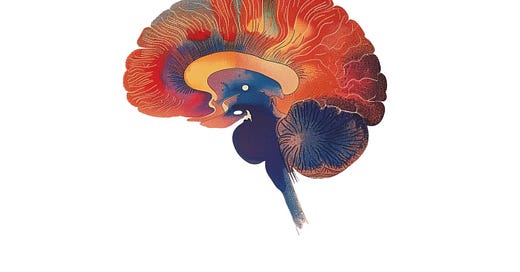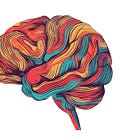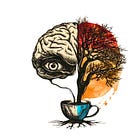Welcome to Part 3 of our series on physicalism, the theory that the physical world can fully explain consciousness. This week let’s examine reductive materialism (often called the identity theory).
This article will draw on concepts we covered in Parts 1 and 2. So, if you haven’t done so already, you may want to read Parts 1 and 2 before reading this article, especially if you are new to physicalism theories.
Part 1
Part 2
This week we’re asking four questions:
What is the identity theory of the mind?
Why might someone believe in the identity theory?
What is the main objection to the identity theory?
What is the counter-argument to this objection?
Q1. What is the Identity Theory of the Mind?
In its simplest form, the identity theory of the mind is the idea that the mind is the brain.
In other words, every experience, such as feeling happy or thinking about a problem, is fundamentally one and the same as a particular pattern of neuronal activity or brain state.
The identity theory adopts a reductionist approach, meaning it claims that the mind (or consciousness) is one and the same thing as the neural processes that give rise to it. When making this claim, the identity theorist often draws on analogies found in other areas of science. For example, they might liken consciousness to light or temperature, claiming that just as light is simply electromagnetic waves and temperature is simply the kinetic energy of molecules, specific conscious states are simply specific brain states. Just as light doesn’t seem like electromagnetic waves, and temperature doesn't seem like the kinetic energy of molecules, consciousness doesn’t seem like neural processes — but that’s what it is.
Proponents of the identity theory argue that as neuroscience, particularly cognitive neuroscience, advances, it will eventually uncover the precise brain states and processes that correspond to specific experiences. This one-to-one correspondence between the mental and the physical would effectively dissolve the perceived divide between the mind and brain. The mind is simply the brain.
Notice how the identity theory claims that the brain is the only possible basis for consciousness. If the mind is the brain, there is no room for artificial intelligence (AI) to ever be conscious. Some may find this view narrow-minded. Indeed, the identity theory has been dubbed the carbon chauvinist theory. But just because a theory might seem narrow-minded doesn’t mean it isn’t true. There are several reasons why someone might advocate for the identity theory.
Q2. Why might someone believe in the identity theory?
There are three main arguments often raised in support of the identity theory:
Humans are physical beings
Our bodies, including our brains, are composed of matter and energy that operate according to the laws of physics. Since we are part of the physical world, some argue that it follows that our behaviour, cognition, and conscious experiences are best understood as physical processes, too.
Evolutionary explanation
Over billions of years, evolutionary forces have gradually shaped our brains to better take in our environment and coordinate our behaviour to ensure survival and reproduction. It is the product of an extended evolutionary process driven by physical causes. From this perspective, the identity theorist argues that consciousness is no different. Consciousness is simply an evolutionary adaptation. We have conscious experiences, simply because it is favourable for survival and reproduction.
The neural dependence of mental phenomena
There is an abundance of evidence from the neurosciences that our thoughts, emotions, perceptions, and sensations depend on the brain’s structure and activity. We know that if we damage or alter specific brain regions, we will see corresponding changes to specific behaviours and mental abilities. For instance, damage to the hippocampus, a region deep in the brain, can severely impair the ability to form new memories, while injuries to the visual cortex at the back of the brain can cause blindness or visual impairments.
But we don’t have to damage the brain to see the connection between the brain and the mind — modern neuroimaging techniques, like functional MRI scans, have been correlating particular conscious states with specific brain patterns for many years.
Q3. What is the main objection to the identity theory?
One argument against the identity theory stems from the first-person experience of consciousness and subjective awareness. When we introspect and examine our own thoughts and feelings, they can seem fundamentally different from purely physical processes. We’ll address this argument a little later on. For now I want to focus on the main argument against the identity theory of mind.
The Category Error Argument and Leibniz's Law
The most popular critique against the identity theory of mind is the argument that it commits a category error by conflating mental and physical properties. According to this objection, consciousness belongs to a fundamentally different ontological category than brain states and brain processes.
This argument draws on Leibniz's Law, which states that if two things (x and y) are absolutely identical, then any property that applies to x must also apply to y, and vice versa. For example, we might claim that the morning star is the evening star. According to Leibniz's Law, any property that applies to the morning star must also apply to the evening star. Because both the morning star and the evening star refer to the planet Venus, we can conclude that they are, in fact, the same celestial body, just observed at different times of day.
Critics of the identity theory argue that there are properties that apply to consciousness that do not apply to brain states and processes. For example, consciousness is often described as the intrinsic subjective first-person experience, while brain states and processes are observable from a third-person viewpoint. Therefore, according to Leibniz’s Law, the mind (or consciousness) cannot be the brain.
Q4. What is the counter-argument to this objection?
Many view Leibniz's Law as the strongest argument against the identity theory. However, the philosopher U.T. Place offers a counterargument that is worth reviewing.
In his seminal paper, Is Consciousness a Brain Process?, Place suggests that logical arguments, like Leibniz’s Law, fundamentally misunderstand the identity theory’s claim.
Before we get into Place's counterargument, we need to discuss the word 'is'.
Place explains that we can use the word is in different ways. And in the sentence the mind is the brain, the meaning of the word 'is' can be ambiguous.
The is of definition.
We can use ‘is’ in the definitional sense. This is usually in the form of ‘noun is noun’. For example, we might say that a square is an equilateral rectangle or red is a colour. In this case, if our statement is true, it will be necessarily true by definition. A statement — a square is an equilateral rectangle — is true based on the very definitions of the terms square and equilateral rectangle.
If a statement that uses the is of definition is false, we can use logical grounds to dismiss it. For example, if I were to say that a triangle is a square, we could logically argue that this violates the definitions of triangle and square since a triangle, by definition, has three sides while a square, by definition, has four equal sides.
Similarly, if I were to say that red is blue, we could logically argue that this violates our definitions of red and blue.
Notice how the is of definition is argued on logical grounds (we don’t use empirical evidence to make these arguments). Arguments made on logical grounds are often arguments about the meanings of words.
The is of composition.
We can also use ‘is’ in the compositional sense. This type of ‘is’ can usually be found as ‘noun is noun’. Place gives some examples — ‘His table is an old packing case’ and ‘Her hat is a bundle of straw tied together with string’. If these statements are true, they are not true by definition. It is not the case that her hat is guaranteed to be a bundle of straw tied together with string. It just so happens that, in this case, her hat is composed of a bundle of straw tied together with string.
We can’t use logical grounds to dismiss statements that use the is of composition. If I were to say that my desk is a suitcase, you wouldn’t use logical grounds to prove my statement wrong. Instead, you would look for empirical evidence — you need to go to my office and collect evidence as to whether or not my desk is, in fact, a suitcase. You can’t use logic to assess the validity of my claim — you need science.
The is of predication.
The final ‘is’ is the is of predication. This type of is can be found in the form of noun is an adjective phrase. For example, Superman is six feet tall.
Place explains that if we add ‘and nothing else’ to an ‘is’ statement and the statement makes no sense — the statement is probably using the is of predication. For example, Superman is six feet tall and nothing else does not make sense. Superman is more than the attribute of being six feet tall; he is also an alien from the planet Krypton, has a secret identity, is a pop culture icon, etc. The phrase six feet tall simply describes the height attribute of the noun Superman.
The question is, what ‘is’ is the identity theory using?
We can probably dismiss the idea that the identity theory’s claim that the mind is the brain uses the is of predication. The theory doesn’t seem to claim that the mind simply describes an attribute of the brain. Their claim seems to be stronger than that.
So, the question is — does the identity theory’s claim use the is of definition or the is of composition?
If the is in the statement, the mind is the brain uses the is of definition, the identity theorist would claim that the mind is the brain by definition — the word mind means exactly the same thing as the word brain.
Place argues that critics of the identity theory mistakenly believe this is the claim the theory makes — critics believe it uses the is of definition. Because of this, they argue that the identity theory is subject to the constraints of Leibniz's Law. If the mind and the brain are absolutely identical, then all properties of the mind must apply to the brain and vice versa. As the argument above shows, such an argument would be made on logical grounds and would show the identity theory to be false.
But, Place argues, the identity theory does not use the is of definition — it uses the is of composition. The mind is composed of the brain rather than defined by it. In this sense, the mind and the brain can have different properties while still being identical (in the same way water and H₂O can have different properties but be identical).
When we talk of water, we don’t necessarily conceive of it in the microphysical H₂O sense. We can coherently discuss and observe water at a macroscopic level without knowing its precise composition. The meanings of water and H₂O differ in our conceptual frameworks.
In Part 2 of this series, we mentioned different levels of reality: the fundamental level, the macro level, the constructed level, and illusions. When we talk about water being wet, we are most likely talking about water at the macro level. When we talk about water as H₂O, we are talking at a more fundamental level of reality.
Just because we can talk about water at both the macro and the chemical level does not imply that water and H₂O are fundamentally different things. We do not claim that two things exist — water and H₂O. No! When we talk about water and H₂O, we simply use different words to describe the same phenomenon at different levels of abstraction.
Likewise, the identity theorist claims when we talk about the mind and the brain, we are not talking about two different things — we are simply using different words to describe the same phenomenon at different levels of abstraction.
Place argues that because the identity theory uses the is of composition, it is an empirical scientific hypothesis about the actual composition of mental and physical phenomena in the world. A scientific hypothesis cannot be dismissed purely on logical grounds. Arguments from Leibniz’s Law don’t work for claims that use the is of composition. Place argues that we must turn to empirical scientific evidence about the relationship between consciousness and brain states if we wish to evaluate or disprove the identity theory. Armchair logical analysis is simply insufficient.
Like all consciousness theories, the identity theory draws scepticism from many thinkers. I suspect you may have several reservations, caveats, or objections to this one! I can’t wait to read your comments.
Next in our series, we will examine an attack on the identity theory’s claim — when we discuss functionalism.
In the meantime, if you are interested in learning about other (non-physicalist) theories of consciousness, you may enjoy the following articles:
Thank you.
I want to take a small moment to thank the lovely folks who have reached out to say hello and joined the conversation here on Substack.
If you'd like to do that, too, you can leave a comment, email me, or send me a direct message. I’d love to hear from you. If reaching out is not your thing, I completely understand. Of course, liking the article and subscribing to the newsletter also help the newsletter grow.
If you would like to support my work in more tangible ways, you do that in two ways:
You can become a paid subscriber
or you can support my coffee addiction through the “buy me a coffee” platform.
I want to personally thank those of you who have decided to financially support my work. Your support means the world to me. It's supporters like you who make my work possible. So thank you.












I think Place is right. Wittgenstein’s 1923 treatise nailed the very thing this debate mirrors: Philosophical problems are artifacts of natural language, one reason bots are not the best at reasoning. Claude 3 Opus is horrible at solving truth tables for truth-functions. There is to much negation, which is a type of ambiguity. . Equivocation, ambiguity, puns, all these quirks in natural language create havoc when one intends one specific meaning for one specific thing. The mind is brain and nothing else, a structural ambiguity, could be true to one person but not to another, leading to recriminations and possibly fist to cuffs:) do you know about Word Grammar (WG) (cf: James Hudson). Word grammar is superordinate to syntax in that syntax is dependent on words in phrases. For example, a ship inherits information from oceangoing in the background in the same way that rowboat inherits information from river going, spreading activation to other abstract nodes of meaning that activate fishing or cargo or banks or waves. A noun isa noun is an inheritance relationship. So in word grammar a mind isa brain means that mind inherits information from brain in a semantic network. Here’s what interests me. In WG words can take affixes which alter the semantic network big time. Farm, for example, becomes farmer. In this case, farm might refer to Venus as morning star does, but farmer does not refer to the same Venus at all. Category error would start blinking red, yet if we take one step back these words (farm and farmer) are so tightly connected we really can’t have one without the other.. We can have a minder that becomes a reminder, but we can’t have a farmer that becomes a refarmer. Inheritance properties of farm is very different from mind in level of abstraction. But brain is concrete while mind is abstract. We can remind but we can’t rebrain. We can be thoughtful and mindful but we can’t be brainful. Each suffix is a syntactic signal that pushes the word toward a nuanced inheritance. Although in the end I think Place is right, I don’t think it’s the end of the argument.
Another good article with clear explanation.
My main objection is that all the so-called “reasons” to think identity theory is true, merely assume their conclusion. It doesn’t address the hard problem that consciousness transcends any appeal to structure and function. Physics doesn’t include the properties of mass, dimension, charge and …. pain.
Physics deals in quantitative properties, experience is pure qualitative. That divide between quantity and quality can’t be bridged by more correlations. That’s far more than different layers of abstraction.
We’re physical beings therefore consciousness is physical doesn’t address the fact that consciousness doesn’t have any properties we think of as physical.
The appeal to evolution doesn’t explain what consciousness is or it’s place in the world, it only says it’s useful so ifff it’s physical it’s likely to selected.
And mind brain correlations are a statement of the problem, not a reason to prefer any solution.